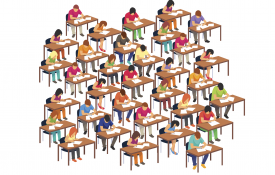-

New Research From Psychological Science
A sample of research exploring how trait anxiety relates to attention, how choosing different career paths may shape personality development, and how attentional selection contributes to risky decision making.
-

Robinson and Berridge Receive Grawemeyer Award for Addiction Research
APS William James Fellow Terry Robinson and APS Fellow Kent Berridge of the University of Michigan have won the 2019 University of Louisville Grawemeyer Award For Psychology for their research on the role of neural
-

NSF Invites Grant Proposals for Studying Personalized Learning in the STEM Workforce
The National Science Foundation is interested in receiving new proposals and supplemental funding requests to support flexible personalized learning to prepare the science, technology, engineering, and mathematics workforce.
-
Spoiler Alert! The Psychology Of Surprise Endings
Writers and filmmakers hoping to hoodwink their fans with plot twists have long known what cognitive scientists know: All of us have blind spots in the way we assess the world. We get distracted. We forget how we know things. We see patterns that aren't there. Because these blind spots are wired into the brain, they act in ways that are predictable — so predictable that storytellers from Sophocles to M. Night Shyamalan have used them to lead us astray. In recent years, some scientists have begun to ask, can stories serve as a kind of brain scan?
-
Superman May Inspire Altruistic Behavior
For all their box-office success, superheroes haven't gotten much respect of late. A 2017 study reported that preschoolers who identify with superheroes tend to be more aggressive than their peers. Numerous pop-culture commentators, including Bill Maher, argue that these characters share some blame for the presidency of Donald Trump, citing superheroes' advocacy of vigilantism, and the comic-book message that only one extraordinary man can save us. But new research suggests that the Man of Steel may have been maligned: It reports that people exposed to images of Superman were more likely than others to engage in helpful behavior. "Heroes loom large as exemplars of morality.
-
Your Dog May Not Be a Genius, after All
If you are convinced your dog is a genius, you may be disappointed in the conclusions of a study just published in the journal Learning and Behavior.The study finds that dogs are cognitively quite ordinary when compared to other carnivores, domestic animals, and social hunters. “There is no current case for canine exceptionalism,” the authors conclude. That we think otherwise is not surprising.

